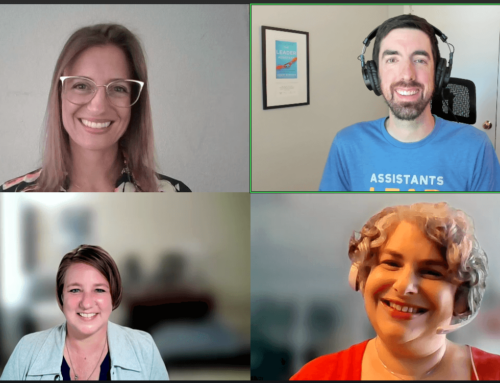You’ve probably heard the saying, “It’s lonely at the top.” It means it’s tough to make friends when you’re in a position of power, and it’s typically used when referring to CEOs, presidents, pastors, etc. A quick Google search tells me the saying originated from a Chinese proverb that literally means “It’s cold at the top (of a mountain).” Feel free to fact-check this and send me an email if I’m wrong.

Source: Gratisography
The point is your executive has one of the loneliest jobs. But you—the assistant who works side by side with them—also have one of the loneliest jobs. It’s cold at the top for you too.
In my last role, I worked out of the founder’s home office most days. Just me and his dog hanging out by ourselves. In my current role, before covid I worked in an open office with eighty-plus team members, but I was the only assistant, so it could still be lonely. Those times when you overhear a coworker plan a team outing while your team (or lack thereof) is comprised of you and your laptop. Or when it’s performance-review season and your executive forgets to sit down with you to go over your evaluation. Or the countless times you’re the last one at the office working on a project.
I experienced numerous moments of isolation, but I didn’t truly grasp how lonely the role of an assistant was until I left my last job. After submitting my resignation, I was left with my family and a couple of close friends. I was on the outside looking in and struggled to process the emotions I felt. Sure, a lot of people knew of me—this comes with the territory when you’re assistant to a founder. But very few people truly knew me.
One of my all-time favorite TV series is a show called Rectify. The main character spends nearly twenty years on death row before a new DNA test nullifies his conviction and he’s released. I was watching one episode while still in the thick of trying to rectify (pun intended) my loneliness. This quote from the main character hit a bit too close to home for me:
“When you are alone with yourself all the time, with no one but yourself, you begin to go deeper and deeper into yourself until you lose yourself. It’s a perverse contradiction. It’s like your ego begins to disintegrate until you have no ego. Not in the sense that you become humble or gain some kind of perspective, but that you literally lose your sense of self. And I’m not sure anyone, unless they have gone through it, can truly understand how profound that loss is.”
I know my situation was nothing compared to being on death row for twenty years. And my lack of connection to others was partly my fault for giving up on people (more on this later). But this quote describes exactly how I felt at the time. I had lost my sense of self in the midst of serving others. I was disconnected from those who could understand what I was going through.
I dive into how you can avoid ending up alone like I was in my book. But for now, let’s look at one of the biggest contributors to my isolation: the dehumanizing nature of being an assistant.
The Dehumanization of Assistants
We’ve all been there. Someone across the room waves in your direction. You wave back, but then you quickly realize they weren’t waving at you. You pretend you were waving at someone else so you don’t look like a fool.
A similar scenario happened to me over and over again during my time as an assistant at my last organization. I’d walk into a room and someone would come up to me and say hi. I’d say hi back and we’d exchange small talk. As the conversation progressed, I’d realize this person wasn’t ultimately interested in me. This was a common conversation for me:
“How’s your boss doing?”
“He’s good. Things are crazy busy as usual, but he’s hanging in there.”
“Good, good. (Awkward pause.) Well, let him know I’m thinking about him and tell him if he ever needs anything to give me a call.”
“Sure thing. Thanks a lot!”
On one hand, I saw these frequent interactions as just part of the job. However, they didn’t just happen at work. They occurred “off the clock” in social settings, during random run-ins at the grocery store, via text messages, and more.
Deep down, I know my value as a human being doesn’t come from other people. However, when the people I interacted with continued to look through me and at my executive, it took a toll. It was dehumanizing. I felt like a tool that others used to get the inside scoop on my executive. I felt less like a valuable human and more like a robot, or an animal.
I eventually gave up trying to relate to people as friends of mine, and instead related to almost everyone as friends of my executive. I stopped opening up and being vulnerable with others. I assumed anyone who tried to get close to me just wanted to use me to get to my executive.
I thought the dehumanizing experiences I had as an assistant were just the way the world is. It became difficult to believe the best about people, and it still is to this day.
People Are Drawn to Power
People like to befriend those in power more than those supporting the ones in power. They want to be in these “power relationships” to make themselves feel important. Once you’re aware of someone’s motives, it’s no longer surprising when they get close to you to get close to your executive. But it’s still dehumanizing.
It has been years since I left my previous organization, and I can count on one hand the number of people who’ve reached out along the way to see how I was doing. All the while, dozens upon dozens reached out to my previous executive (who was fired) to check in on him. People are drawn to those in power, even when the powerful fall.
Of course, executives also contribute to the dehumanization of assistants. One assistant told me their executive walked by their desk every day for years but rarely acknowledged their presence and never even learned their name. Countless more assistants have shared their stories of disrespectful and abusive executives, as well as hostile work environments.
What about you? Do people try to get close to you just to get close to your executive? Do your “friends” change based on whom you’re supporting? Do coworkers introduce guests to your executive but not to you? Is your executive abusive?
To engage in relationships in a professional and helpful way, first acknowledge where you’ve experienced dehumanizing relationships.
Vulnerability
When I was a teenager, I was emotionally aware and willing to be vulnerable. At the time, I thought it was great to be the guy the girls could rely on. These female friends would tell me everything as we chatted on AOL Instant Messenger (I feel old, ha) at all hours of the night. I fell in love with a few of them (I bet you saw this coming) and shared how I felt.
Time after time, I’d get the dreaded response: “Jeremy, that’s sweet, but you’re like a brother to me.” I’d be crushed.
I repeatedly fell in love with people who didn’t share my sentiment. Eventually, I chose to avoid the pain involved with being so vulnerable and started to close myself off emotionally.
I then found out my dad had an emotional affair, which affirmed and amplified my newfound reluctance toward vulnerability. I was well on my way to shutting down emotionally, and all of this was before the dehumanizing relationships I experienced as an assistant.
Over time, I didn’t simply stop being vulnerable with people—I began to neglect and avoid relationships altogether. I convinced myself I didn’t need people. At the time of my career shakeup, I was connected to just one assistant whom I could call.
I’ve since connected with other assistants who’ve been through what I’ve been through. This has been refreshing and encouraging as I attempt to rebuild my relationship capacity, one conversation at a time. I’m much less cynical and cold-hearted than I was before, and although I still keep things close to my chest for a long time, I’m at least aware of the struggle.
On one hand, I want to encourage you to be vulnerable and open up to others. As Alfred Lord Tennyson put it, “’Tis better to have loved and lost than never to have loved at all,” right?
On the other hand, I want to tell you not to trust anyone and to go it alone. I’m not going to do that, though, because I now know that’s a miserable way to live.
Instead, I’ll encourage you to be vulnerable, take risks, and put yourself out there, but also to be aware of how people might use or abuse you. Life is too short to journey across your career and personal glaciers alone, but it’s also too short to let others walk over you to climb their own glacier.
Take an audit of your current relationships, then do your best to limit the time spent with those who use you. If you’re not sure which of your relationships are healthy, find a trusted friend with an outside perspective to help.
Hopefully, you haven’t experienced many dehumanizing interactions in your career, but if you have, please don’t shut down. See a counselor or therapist like I did. Hire a personal development or career coach. Take calculated risks.
Be vulnerable—before you’re stuck without anyone to be vulnerable with.
—-
This post is an excerpt from my book, The Leader Assistant: Four Pillars of a Confident, Game-Changing Assistant. In the book, I follow up this section on dehumanization with a look at growing your network of assistants, then I walk through ways to lead your relationships with your executive and your coworkers.





